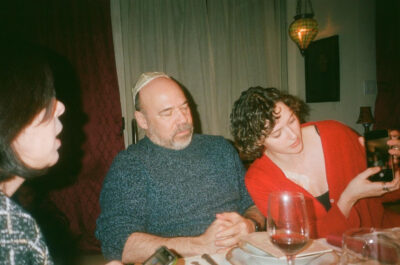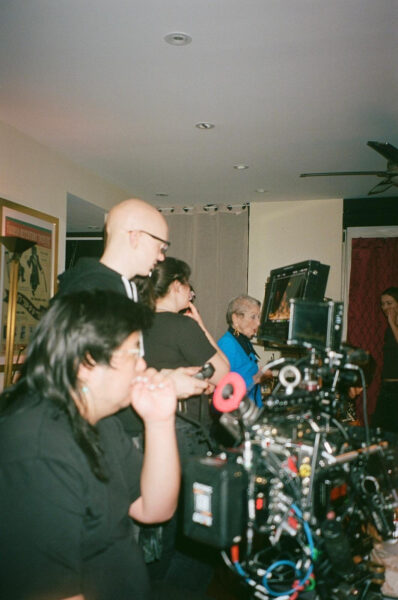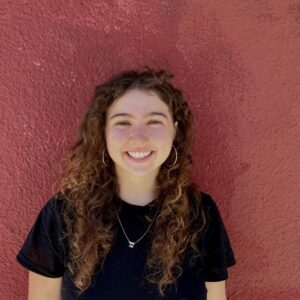Daisy Friedman is an up-and-coming writer/director whose most recent film, Unholy, premiered at the Sundance Film Festival this year. The film follows a young woman, Noa, as she navigates her family’s Passover seder with a gastrointestinal disorder that requires a feeding tube. In her own words, “Unholy is a film about what it means to cultivate your own traditions when tradition is inaccessible to you; [the film] gets at the heart of the connection between food and love in Judaism and turns it on its head.” Beyond Sundance, Friedman has shown her films at SXSW, the Florida International Film Festival, Aspen Shortsfest, the National Film Festival for Talented Youth, the Omaha Film Festival, and Reelabilites.
How did you navigate telling a family story in a way that reaches a broad, and not necessarily Jewish, audience? Did the intended audience shape the writing and directing process?
The thing I have always heard—and it’s so true—is to make a story specific, because that is what will make it universal. A lot of people feel like outsiders in their families. Whether it be for Jews because they are more or less religious, more or less politically aligned with their families (especially now), whether it be for queer and trans people who feel alienated from their families, there is so much that fits. Food was the perfect way for me to do that in Unholy, because Jewish culture and ritual is so deeply food-oriented. Unholy definitely targets Jewish audiences, but the general concept of an uncomfortable family meal, not being able to eat the food, having people ask insane questions, is totally universal. I was very intentional about the element of traditional ritual that made the final cut. For example, the karpas scene was so critical because it represents tears and suffering, and you can’t make a film about passover without matzah, so obviously that went in there.
Food and everything that accompanies it—eating-related issues, invisible disabilities, and sensitivity around food for socio-historical reasons—are so central to Jewish culture. You have also spoken publicly about your personal history as a multiple organ transplant recipient and how it has affected your relationship with food and Jewish culture. What was it like to write and direct, what is, in many ways, your own story?
It was a little masochistic. The thing is, Unohly both is and isn’t my story. I got to create a different version of my life which was really trippy and scary, but also beautiful. Because I don’t have a lot of memories from that time in my life, it was really cathartic to see it played out in this way, and even create clarity and closure for myself.

To me, the most interesting thing is that in Ashkenazi culture, everything is about food, but everyone has stomach problems! It is a little funny, but in a real way, it’s not funny at all. It’s not that people aren’t talking about it—they are actually talking about it all the time—they just aren’t saying anything that matters.
The most moving part has been talking with people who come up to me after screenings being like, “I don’t have short gut syndrome, but I do have Celiac” or “I do have IBS” or “my husband has Crohns.” I think it makes both of us feel seen! On Letterboxd, or more mainstream reviews, a lot of people don’t get it, which is fine. You can tell who gets it and who doesn’t. It is just so moving to hear from people who relate. That is really the goal. At the end of the day, I want to create work that I never saw as a kid.
On a related note, I never say explicitly in the movie, but Noa’s family are Conservative Jews—basically, they care enough about having a “traditional” seder that it is a problem that Noa cannot fully participate. People don’t often see a representation of someone who is marginalized being brought back into tradition. I hope someone makes a movie like this about being queer and trans, about marrying outside of their culture in a way that isn’t shticky. It is so necessary to have representation of culturally traditional families being weird and trying to get through it. This particular avenue just happens to be my expertise.
How did you make creative choices in representing Jewish culture through humor, religious tradition, and food in ways that are legible to a diverse audience?
I see Unholy as a comedy more than anything. Obviously it’s not a slapstick, but what I’ve always heard is that when you are writing drama comedies you want to make people laugh and disarm them, and then punch them with emotion, so that is what we tried to do.
My mantra about the food during pre-production was “FOOD PORN, FOOD PORN, FOOD PORN.” We wanted to make the food so specific, so intricate that it was almost grotesque. We also worked that in with the music. Whenever Noa sees food, there is a musical queue that heightens her emotional experience of this thing (the food) that is so central to her Jewish experience, and yet is utterly inaccessible to her. The food becomes larger than life, it almost has a godly presence—you know it’s there, but you can’t touch it.
In one of the last scenes of the film, the Father (played by Danny Burstein) blesses Noa. That was one of the very few scenes that was just for the Jews. There is a version of the script where we included the English translation, but then we cut that. My intention was “if you know, you know” and if you don’t…read the subtitles—it’s still beautiful.
What was your experience as a young writer/director working with more experienced actors and producers?
It was really scary! But the actors were so down for the cause. They knew what they were getting themselves into and anyone who did and wasn’t into it said no. I will say, I think I surprised the team in terms of professionalism. I think a lot of people thought they were walking into a student film which—technically yes, I was a student who was making a film—but it wasn’t what you would think of as a student film.
Even me, I remember walking onto the set on day one and the crew had gotten there before me and was already setting up. I was like, “Oh shit, this is bigger than I thought it was going to be. I have to step into this.” I still feel inexperienced enough to be okay with not knowing all the answers. I remember multiple times, I would go to Danny and be like “I’m not sure what to do, what do you think?” and he would give fantastic notes and I would be like, “Great! We are doing that.” Having a group of people that were all rising to the occasion with me and were helping me where I fell short was amazing.
And yet, coming off of everything that has happened, people are still not willing to take a chance on a young, female director. I haven’t gotten any calls for jobs, which is okay, but I am realizing that what everyone says… “you have to work (at least) twice as hard” is true.
My favorite (and super Jewish) thing about Unholy is how, during the seder, everyone is constantly talking over each other with the perfect amount of background noise that replicates a real seder—at least my family’s seder—almost exactly. That seems like a key moment where writing and directing have to be in lock-step.
A lot of the writing does have overlapping dialogue—I use a software that a lot of screen writers use called final draft. It is usually used for arguments and the like. There was also a lot of improv. I gave everyone a handful of topics they could choose from—stocks, politics, marriage and dating, Judaism as a concept, and careers—and they couldn’t talk about anything else! It kept the conversation within the cultural world and it worked perfectly. One thing we chose to do technically (which was actually inspired by the movie Maestro) was we gave everyone a mic so we could layer every single conversation which creates the sonic undercurrent.

How does Unholy fit into your larger body of work?
I want to keep exploring the intersections between Jewish stories, the dynamics of alienation, and the notion of the medical body and the social body. It’s all there. The prevalence of explicit Jewishness will definitely vary based on the project, but I have felt so spiritually deepened by Jewish values. As a multiple organ transplant recipient, knowing that pikuach nefesh and b’tzelem elohim are core values of my tradition is incredible. Making those connections carefully and thoughtfully to creative work about disability seems so obvious to me. I hope we can get to a place in film where there can be a disabled character and it’s just what it is, it’s not the topic of the film per se. It is definitely what I am striving toward.
Do you have any projects on the horizon?
Short term, I am in a program in New York City called United Filmmakers Organization (UFO) which supports two short films over the course of 18-months, so I have two shorts slated for that. The first one is a rom-com/drama about a girl who has to go to the ER after a sexual experience gone wrong. It has to do with disabilities, it has to do with bodies, societal expectations, fragility…all those things. The second short will likely be about Jewish summer camp! It foregrounds love and dating and how politics tie into all of that.
I am developing a full feature of Unholy right now! There will also be a whole romance arc there, so stay tuned. I am also working on a horror feature about medical gaslighting. It follows a girl who seeks revenge on a surgeon who performs unnecessary surgery on her for sexual pleasure. It explores body dynamics and power in the medical space.

